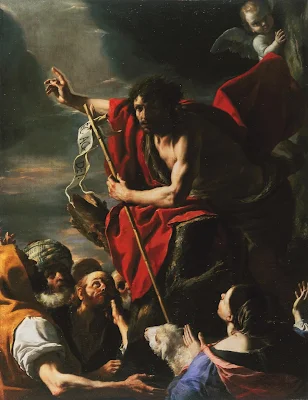Neither the proud, nor the wanton, nor the greedy enter the eternal wedding banquet; therefore, the Introit of this Sunday says against pride, “See my abjection”, against wantonness, “and my labor,” and against greed, “for I am needy and poor.”
Introitus Ps. 24 Réspice in me et miserére mei, Dómine: quoniam únicus et pauper sum ego: vide humilitátem meam et labórem meum, et dimitte omnia peccáta mea, Deus meus. V. Ad te, Dómine, levávi ánimam meam: Deus meus, in te confído, non erubescam. Gloria Patri ... Réspice in me...Introit Ps. 24 Look upon me, and have mercy on me, o Lord, for I am alone and poor. See my abjection, and my labor, and forgive me all my sins, o my God. V. To thee, o Lord, have I lifted up my soul; in Thee, o my God, I put my trust; let me not be ashamed. Glory be to the Father... Look upon me...
And because of these things, Peter urges us towards humility, saying in the Epistle (1 Peter 5, 6-11), “Be you humbled therefore under the mighty hand of God, that he may exalt you ”, and “Be sober and watch”, i.e. in prayers, “because your adversary the devil, as a roaring lion, goeth about seeking whom he may devour.”
And because the Lord has such great care for us, therefore in the Gradual, the Church invites us to “Cast thy care upon the Lord, and he shall sustain thee.” ...Graduale
Ps. 54 Jacta cogitátum tuum in Dómino. et ipse te enútriet. V. Dum clamárem ad Dóminum, exaudívit vocem meam ab his, qui appropinquant mihi.
Gradual Ps. 54 Cast thy care upon the Lord, and He shall sustain thee. V. When I cried out to the Lord, He heard my voice, from those that draw near to me.
(In the following allegorical explanation of the Gospel, the ten coins represent angels and men, who belong to God; the lost coin represents fallen man; and the lighting of the candle to find it represents the Incarnation.)
... In the Gospel of this Sunday (Luke 15, 1-10) is written, ... “Or what woman having ten silver coins”, that is angels and men, “if she lose one”, i.e., a man, upon whom he had depicted his own image (as a ruler places his own image on a coin) “doth not light a candle”, that is, human nature, in which he set the light of divinity, uniting it to the Faith, “and seek diligently until she find it? And when she hath found it, call together her friends and neighbors, saying: Rejoice with me, because I have found the coin which I had lost.” Behold how great is God’s benevolence towards us!
Again, this Mass is about the penitent, as appears from the both the Communio and the Gospel, in which the sheep represents the penitent, ... and therefore, it is sung around the time of the feast of the blessed John the Baptist, of whom we read that he called the people forth to repentance.  |
| St John the Baptist Preaching in the Wilderness, ca. 1665, by Mattia Preti. |
William Durandus’ classically medieval style, simultaneously allusive and verbose, makes this passage of his Rationale Divinorum Officiorum (6, 117) fairly difficult to follow; I have therefore moved the passage about the Gospel to follow the order of the Mass.
